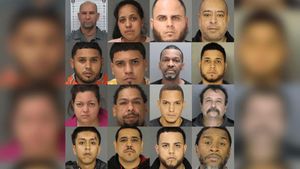Pope Francis remains hospitalized at the Gemelli Polyclinic in Rome as his health continues to be described as "critical," especially following recent respiratory crises. The Vatican reported on Saturday, February 22, 2025, the 88-year-old pontiff experienced prolonged asthmatic respiratory distress requiring high-flow oxygen and multiple blood transfusions due to anemia.
His physician has assured the public of total transparency surrounding the Pope's condition, which has seen fluctuations over the past week. Initial hospitalizations began on February 14 after the Pope exhibited symptoms of bronchitis. Complications arose, leading to diagnosed pneumonia affecting both lungs, raising significant health concerns.
During the latest health updates, the Vatican's communications confirmed the Pope is currently alert but experiencing increased discomfort. Reports noted, "The Pope is not out of danger," emphasizing the precarious nature of his health.
On the morning of Sunday, February 23, it was revealed by Vatican sources, the Pope had "a quiet night" and is capable of eating on his own, yet he still requires nasal glasses for supplemental oxygen. The situation was grave enough to necessitate cancellation of the weekly Angelus prayer, which the Pope traditionally leads. Instead, the Archbishop Rino Fisichella took to provide the homily prepared by the pontiff.
The faithful have gathered daily outside the Gemelli hospital, expressing hope and prayers for the Pope's recovery. Couples and families alike have conveyed their thoughts and prayers, stating, "We know the state of the Pope and hope he gets well soon." Meanwhile, global leaders such as Cuban President Miguel Díaz-Canel and Mexican President Claudia Sheinbaum have expressed their best wishes, acknowledging Pope Francis as a great humanist dedicated to the welfare of the poor.
Sheinbaum described the pontiff as someone who promotes fraternity among nations, showcasing the global impact and concern surrounding his health. The Vatican has reiterated the necessity of dedicated medical attention, highlighting the complexity of the Pope's pneumonia and emphasizing the careful management of his medical care during this challenging period.
Notably, the Pope's health complications have prompted many supporters to rally for prayers. A statue of former Pope John Paul II has become a focal point for gatherings, where community prayers are offered. Pope Francis has expressed immense gratitude to the hospital staff, acknowledging their dedication and care amid his health struggles. He stated his affection for the countless messages of support received worldwide, stating, "Thank you for this closeness and for the comfort prayers I have received from all over the world!"
The Gemelli Polyclinic, where the Pope is receiving treatment, is recognized for its comprehensive medical services and has been integral to many significant health events of the Pope since his papacy began. Recognized globally, the clinic has been home to various visits by the pontiff for health-related issues over the years.
Leading medical professionals have prompted vigilance within the public and the higher echelons of the Church, indicating serious signs of deteriorations, such as possible progression toward sepsis amid the pneumonia diagnosis. This has been underscored by Dr. Teresa Pérez Warnisher, who pointed out the serious nature of symptoms combined with the analytical results triggering necessary blood transfusions. Just recently, healthcare experts emphasized, "More time will be necessary,” indicating the Pope may require continued hospitalization before reclaiming routine duties, potentially extending his duration at the hospital.
Pope Francis continues to occupy the role of the first pontiff from Latin America since his papal election on March 13, 2013, when he chose the name Francis, honoring St. Francis of Assisi, symbolizing his priority for the poor. His hospitalization happens concurrently with significant church events, such as the Jubilee year, proving his influential role continues to be pivotal even amid adversity.
The faithful and global community remain hopeful for his recovery, as the Vatican-wise communication strategy emphasizes the importance of collective prayers and support for the pontiff and reiterates the need for patience and confidence during this health battle. The Pope's long history of addressing poverty, promoting peace, and advocating for social equity underlines the importance of his health to millions worldwide, making this moment even more significant.



